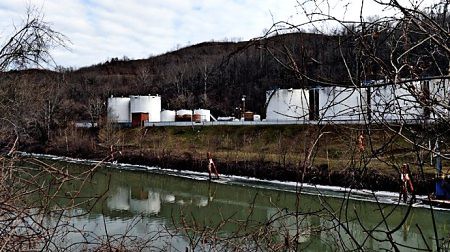
West Virginia chemical spill where water has been contaminated. The crisis is continuing during the Winter of 2014., a photo by Pan-African News Wire File Photos on Flickr.
West Virginia coal industry poisons water supply
By Benji Pyles on January 14, 2014
Workers World
Charleston, W.Va. — A spill into the Elk River near Charleston, W.V., on Jan. 9 from a chemical plant owned by Freedom Industries forced a cutoff of water in West Virginia as a statewide “state of emergency” was called that day and a federal “state of emergency” the following day. The spill contaminated the water supply of customers of West Virginian American Water’s Kanawha Water Treatment Facility, which spans nine counties and serves 300,000 people.
The state government issued an advisory that tap water in these nine counties would not be safe for anything but flushing toilets. The chemical 4-methyl cyclohexane methanol is a sudsing agent used in the process called “froth floatation,” used to remove impurities from coal. Exposure to the chemical can cause skin irritation and burns, respiratory irritation, as well as nausea and vomiting, upon ingestion.
The Federal Emergency Management Agency and the National Guard have been mobilized to distribute usable water as stores run out of bottled water.
On Jan. 10, most public and private establishments, including schools, daycares and nursing homes were closed. The closings left tens of thousands of people without work and with limited access to basic necessities and services. Hospitals remained open by conserving water, but elective surgeries were cancelled. While restaurants and many department store chains were closed, some remain open.
Lawrence Terrell, an African-American department store worker at the Charleston Town Center Mall, told Workers World: “While restaurants and hair salons closed, many stores in the mall stayed open. Since we cannot wash our hands, the bathrooms are basically closed. Just like bottled water, hand sanitizer is also in short supply.”
The total amount of chemical spilled is still unknown as of Jan. 12 and there is as yet no timeline as to when tap water will be safe for general use.
According to the Jan. 10 Charleston Gazette: “The DEP [Department of Environmental Protection] was getting complaints about a strange licorice odor as early as 8:15 a.m. Thursday [Jan. 9], and when its investigators arrived at Freedom Industries later Thursday morning, they found that the company had taken ‘no spill containment measures.’ The DEP said Freedom first reported the spill at 12:05 p.m. Thursday.”
Jerry McIntyre, president of West Virginia American Water, told the Gazette that his water company had had no contact with Freedom Industries. The authorities were not even able to identify the chemical until 4 p.m. At 5:45 p.m., the office of Gov. Earl Ray Tomblin declared the state of emergency.
Freedom Industries remained silent on the spill until the next morning, when the company president, Gary Southern, issued a statement, saying, “This was unfortunate, unanticipated and we are sorry for the disruption.” Southern also claimed the chemical level is of “low toxicity.” Even the corporate media noted Southern’s hypocrisy, as he could be seen drinking bottled water as he issued the statement.
This spill comes as the West Virginia Legislature is beginning its session, where legislators are scheduled to discuss many proposals that weaken Environmental Protection Agency regulations further and give more power to the coal and hydraulic fracturing (fracking) industries.
In the last eight years, West Virginia suffered two major mine disasters — at Sago and Upper Big Branch — as well as many smaller accidents. Two miners died on the job just last October because the Mine Safety Hazard Administration was not in operation during the federal lockout.
West Virginia is ground zero for strip mining, mountaintop removal and now fracking, all processes that endanger the environment and the population. Though the state has rich resources — such as coal, timber, oil and gas — that enrich the corporations that extract them, West Virginia has historically and currently remained one of the most impoverished states.
Spill raises questions
This event raises some obvious questions: When did Freedom Industries know about the leak? Why did they not advise the water company or authorities as to the identity of the chemical? Why were there no monitoring and/or reporting protocols? Why were there no instructions in place to advise those who had been exposed? Why are chemical tanks allowed to be placed beside a river and just upstream from a major water intake in the first place?
This situation is a superb example of the anarchy inherent in the capitalist system, where maximizing profit is given priority over safety.
The public knows little about Freedom Industries. Most people affected were unaware of the company’s existence until the spill. What is known is that Freedom is a distributor for Georgia-Pacific, which is a subsidiary of Koch Industries. The billionaire Koch brothers, Charles and David, are founders of the racist, anti-worker, anti-environmental movement that has imposed the reactionary “FreedomWorks” and “Americans for Prosperity” groups and the anti-worker Tea Party.
This spill is one more example of the disastrous symptoms caused by the profit-driven system. It’s another disaster that raises the advantages of having industry centrally planned and under the control of workers and oppressed people instead of leaving this power in the hands of the ruling class.
Jeremy Bauman contributed to this article. Pyles and Bauman are Workers World Party activists who reside in Huntington, W.Va.
1 comment:
Post a Comment